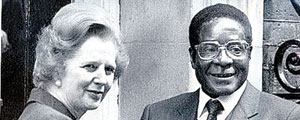
IN a rare show of solidarity, Zanu PF and MDC politicians yesterday unanimously paid tribute to the late former British Prime Minister Baroness Margaret Thatcher’s leadership style, describing her as one of the world’s greatest leaders.
By Senior Reporter
The “Iron Lady”, as Thatcher was known in political circles around the world for her firmness, died from stroke aged 87 yesterday morning.
Britain’s only woman prime minister, the tough, outspoken Thatcher led the Conservatives to three election victories, governing from 1979 to 1990, the longest continuous period in office by a British prime minister since the early 19th century.
With United States President Ronald Reagan, she formed a strong alliance against communism and was rewarded by seeing the Berlin Wall torn down in 1989 though she worried a unified Germany would dominate Europe.
Her radical rightwing views broke the mould of British politics, changing the status quo so profoundly that even subsequent Labour governments accepted many of her policies.
The woman, who became known simply as “Maggie”, transferred big chunks of the economy from State hands into private ownership. “The problem with socialism is that eventually you run out of other people’s money,” she once said.
Her personal credo — founded on competition, private enterprise, thrift and self-reliance — gave birth to a political philosophy known as “Thatcherism”.
- Chamisa under fire over US$120K donation
- Mavhunga puts DeMbare into Chibuku quarterfinals
- Pension funds bet on Cabora Bassa oilfields
- Councils defy govt fire tender directive
Keep Reading
But her tough economic medicine put millions out of work, alienated many and largely destroyed industries such as mining.
In Zimbabwe, Thatcher was credited for presiding over the 1979 Lancaster House conference which ushered in the Lancaster House Constitution, ending the country’s 1970s war of liberation and ushering in independence in 1980.
Zanu PF secretary for administration Didymus Mutasa said his party enjoyed good working relations with Thatcher during her tenure of office as British Premier.
“I was Speaker of Parliament at the time Thatcher was British PM and we met during a conference of parliamentary associations, which was held in London and I thought she was a very likeable person,” Mutasa said.
“It is very sad that she has passed on, especially for her family and Britain as a country, but looking at how she had been supported while walking and how frail she was looking, I think the Lord must have decided it was time for her to rest.”
Mutasa, who is also Presidential Affairs minister, said he had no qualms with Thatcher’s foreign policies on Zimbabwe, including the emotive land issue.
“Of course, at one time Zimbabwe’s relations with Britain went sour, but during her premiership, we were happy with the way she dealt with most issues. She appeared to be honest and did whatever she promised to do.
The Zanu PF minister added: “On the land issue, the policy was to dispose of white-owned land on a willing-buyer and willing-seller basis, but because blacks did not have money to buy the land and whites were not willing to sell the land, President Robert Mugabe had no option except to take back the land and give it to the people. Thatcher did nothing wrong there.”
Prime Minister Morgan Tsvangirai’s MDC-T party spokesperson Douglas Mwonzora described Thatcher as an inspiration to all women in the world.
“She was clear testimony that women can provide good leadership and that is why the MDC-T is embarking on a programme to make sure that women are well represented in positions of power. Thatcher had good international relations skills and we mourn her passing-on,” Mwonzora said.
He said Thatcher’s tenure of office coincided with Zimbabwe’s independence and her policies were good to the extent they provided solutions for Zimbabwe’s problems, especially the end of colonial rule and ushering in Zimbabwe’s independence in 1980.
MDC spokesperson Nhlanhla Dube said Thatcher was “a history-setting and iconic leader” as the first female to lead a country “as aristocratic and traditional as Britain”.
“It was a ground-breaking feat that she set and Zimbabwe will remember her, especially now since we are siezed with debate around emancipation of women. Thatcher will certainly enter the Guinness Book of Records, not only as a female leader, but a great leader,” Dube said.
A British newspaper, The Telegraph, said Thatcher “will go down in history not only as Britain’s first female PM, but as the woman who transformed Britain’s economy in addition to being a formidable rival on the international stage”.











